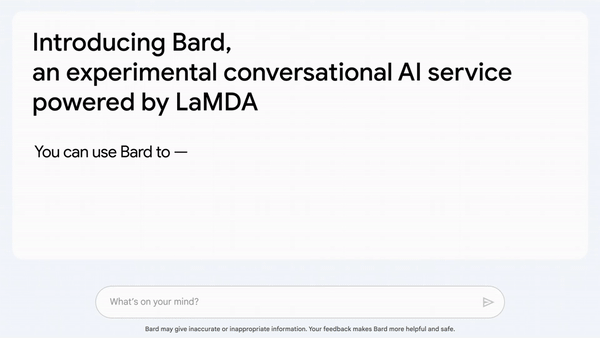Bard is Google’s ChatGPT competitor. Bard is an “experimental conversational AI service powered by LaMDA” — Language Model for Dialogue Applications — that notably “draws on information from the web to provide fresh, high-quality responses” instead of having its training data capped to a certain year.
Bard seeks to combine the breadth of the world’s knowledge with the power, intelligence, and creativity of our large language models.
It’s specifically using a “lightweight model version of LaMDA” that “requires significantly less computing power, enabling us to scale to more users, allowing for more feedback.”
Bard can be an outlet for creativity, and a launchpad for curiosity, helping you to explain new discoveries from NASA’s James Webb Space Telescope to a 9-year-old or learn more about the best strikers in football right now, and then get drills to build your skills.
Right off the bat, Google warns that “Bard may give inaccurate or inappropriate information.” The interface shown off today has a simple text box and mimics chatbots. Generated results can be given a thumbs up/down and refreshed, while there’s a “Check it” dropdown.
This testing phase is meant to “help [Google] continue to learn and improve Bard’s quality and speed.” No other details about how and when the public can try out Bard are available today.
We’ll combine external feedback with our own internal testing to make sure Bard’s responses meet a high bar for quality, safety, and groundedness in real-world information.
How AI is coming to Search
Looking ahead, Google is looking to bring its latest AI advancements — Sundar Pichai named LaMDA, PaLM, Imagen, and MusicLM today — into products, starting with Search.
When people think of Google, they often think of turning to us for quick factual answers, like “how many keys does a piano have?” But increasingly, people are turning to Google for deeper insights and understanding — like, “is the piano or guitar easier to learn, and how much practice does each need?”
The first AI-powered Google Search feature will “distill complex information and multiple perspectives into easy-to-digest formats.” Instead of a Featured Snippet that quotes text from a website, Google will generate direct answers to your question. The company says “new AI features will begin rolling out on Google Search soon.”
The last Google (Cloud) announcement today is a “Generative Language API, initially powered by LaMDA with a range of models to follow” for “individual developers, creators and enterprises.” Onboarding will start next month.
Over time, we intend to create a suite of tools and APIs that will make it easy for others to build more innovative applications with AI.









0 Comments